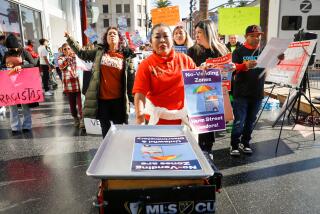LAX Lawsuit
- Share via
The long line of nurses, missionaries, priests, political refugees and religious followers staking out the terminals at Los Angeles International Airport will be allowed to continue seeking donations, at least temporarily, as a result of a federal court order halting a solicitation ban that was scheduled to go into effect today.
A federal judge on Wednesday granted a temporary restraining order sought by Hare Krishnas and others to allow people and groups to continue asking travelers for money at LAX while court hearings proceed on a suit to overturn a city ordinance passed April 1.
A hearing is scheduled May 30 in U.S. District Court on whether to issue a preliminary injunction. Because of the temporary restraining order, airport officials will not put up signs inside the terminals today explaining that soliciting funds is prohibited. If the ordinance goes into effect, violators would face up to six months in jail or a $1,000 fine if convicted.
Attorneys Barry A. Fisher and David M. Liberman filed a joint lawsuit Tuesday on behalf of the International Society for Krishna Consciousness of California and the Committee for Human Rights in Iran to overturn the ordinance on the grounds it violates the 1st Amendment of the U.S. Constitution and the Liberty of Speech clause of the California Constitution, which they say is even more protective than the 1st Amendment.
The attorneys also were granted their request for a temporary restraining order to allow the two groups to continue soliciting funds. Even though the order only applies to the Iranians and Hare Krishnas, the airport will allow other groups to temporarily continue soliciting funds. The order was granted by U.S. District Judge John G. Davies.
*
“We’re very elated. This is the first step,” said Svavasa Dasa, president of the Hare Krishna temple in Venice, who was in court Wednesday morning. “We feel that we have done everything we can to work out something with the city. We don’t really want to go this route, but if we have to, we will.”
“The airport is one of the best places to inform people from all over the world about human rights losses in Iran,” said Bruce Fahima, a member of the Committee for Human Rights in Iran.
Airline officials, who have complained for years that the nonprofit groups hinder travelers hurrying to their planes, remained guardedly optimistic the ban will be upheld.
“We feel that it will be eventually overturned in our favor,” said John Hall, the manager for Terminal 2 at LAX.
Assistant City Atty. John Werlich, who represented the airport in court on Wednesday, added, “It will be upheld because it’s the right thing to do.”
For years, airport officials have tried to rid their terminals, sidewalks and parking lots of solicitors. They got some backing in 1992 when the U.S. Supreme Court upheld the Port Authority of New York’s ban on solicitation at LaGuardia, Kennedy and Newark airports, ruling that the halls of an airport terminal are not akin to streets and sidewalks.
*
Rather, the court ruled, terminals are designed to serve busy travelers who should not be impeded and pressured to contribute. The Supreme Court ruling did not extend to the sidewalks outside an airport.
If the city ordinance is upheld, Los Angeles International Airport would join other airports in California that restrict soliciting. In 1989, Sacramento International Airport banned the solicitation of funds because its facilities were built for 3 million passengers but were used by 7 million every year.
San Francisco International Airport confines solicitors to five booths located in three terminals. But the airport still receives complaints from travelers, said Don Wilson, the airport’s director of public affairs. “We have a file that is three inches thick,” Wilson said. “But being a public agency, we feel we have to strike a balance. We don’t want to impinge on anyone’s 1st Amendment right.”
More to Read
Sign up for Essential California
The most important California stories and recommendations in your inbox every morning.
You may occasionally receive promotional content from the Los Angeles Times.










